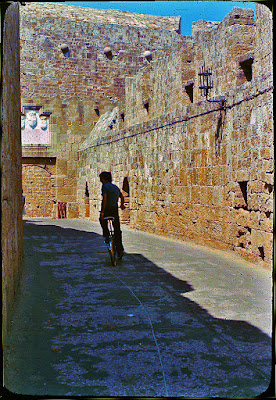Coming off 100 days of abstinence from wine, what will I find? I know where and with whom I will take the step back into the world of drinking and enjoying wine. I hope it to be illuminating. In whatever way it works out, there is so much more to the experience surrounding wine – I won’t be bored.
The Greek perspective regarding wine in Italy takes unbridled imagination. It also helps if one has been to Greece and experienced contemporary culture. My first trip to Greece, in 1977, it might as well have been 2,000 years ago, for so much is changing there. As well, in “Magna Graecia,” winemaking, wealth and world perspectives have shifted. Sicily is an epicenter.
But that all aside for now. What is it to crawl into a headspace and imagine this part of the “colonies” from a Greek mindset? Oddly, it was thinking about Ustica that set this off. An island off the coast of Palermo, which could easily pass for a Greek island in the Dodecanese, a mini Rhodos. As well, Pantelleria could pose as an arid stand in for Paros. Sicily, itself, is the "Magna" of Magna Graecia. How would an ancient Greek, transposed into current time, think?
I feel blinded by a light shined too close. I wrestle with objectivity, but know I will lose. The Greek DNA within me must take over.
Let’s start with the light. I truly believe light to be a transformative element when traveling a land. And while the light in Randazzo is different from the light of Heraklion, there is something about the way up from Catania that reminds me of a memory from a time going farther back than this one, little life.
It’s as if a chorus of souls sits on the side of the road, chanting a timeless hymn. Rolling up the hill from the airport, green lushness, surrounded by the slow-constant chug of La Muntagna above. The sun darts in and out from behind fresh plumes of grey and dense white smoke. Darkly paved streets, hewn from volcanic rock, the towns along the way appear morose in their darkness, dressed up like so many widows in black. A lone bell rings out the time to a town empty at noon. Abandoned shops along the way hint at a once vibrant wine culture. Where did they go?
We follow the road further up the hill, the names sounding less Italian and more Greek. Etnapolis, Olimpiadi, Basile. I start counting to ten in Greek - ένα, δύο, τρία - as if someone is waiting at a counter for me to make change in drachma, or expecting a Καλημέρα instead of a Salutamu.
And for the wine obsessed, what fecund soil is there for digging up some new ideas?
I’m particularly curious with regards to the interchange of ideas, both from ancient and also in contemporary times, between winemakers in Sicily and Greece. Can Assyrtiko and Carricante share best practices? Are there parallels? Do Nerello Mascalese and Xinomavro share a common goal somewhere on the shores of America? This is all under the surface from the impressions and the reality that we see. But, what if?
I think when this chapter is finished I will also have to go back to Greece and see it, feel it from their perspective as well. I can keep practicing my ένα, δύο, τρία for that time.
But for now Olympus can wait – Etna is calling.
Further reading: The Judgement of Paros – The Greek Paradox https://goo.gl/6o9j9H
written and photographed (in Greece ca.1977) by Alfonso Cevola limited rights reserved On the Wine Trail in Italy
wine blog + Italian wine blog + Italy W








1 comment:
Travel safely and enjoy the food, wine, light, air, fire and earth. La Mutagna seems to have settled down for the moment. The timing is good. The Greeks had a word for it, Kairos. Looking forward to reading your dispatches from the volcano.
Post a Comment